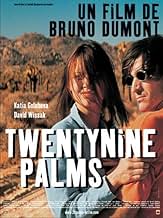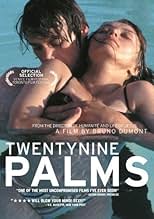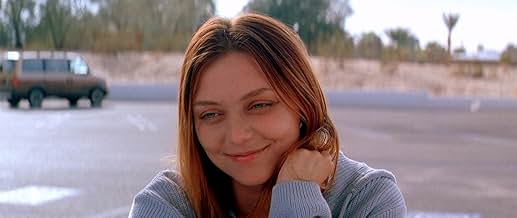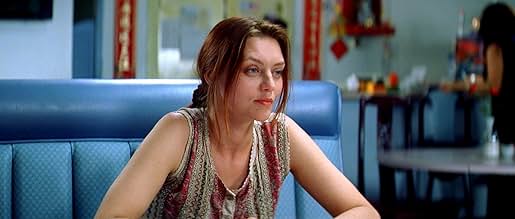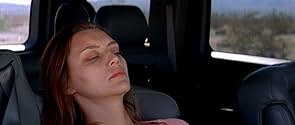IMDb रेटिंग
5.1/10
5.3 हज़ार
आपकी रेटिंग
अपनी भाषा में प्लॉट जोड़ेंDavid, an American photographer, and his Russian girlfriend Katia are scouting locations for a photo shoot. During the day, they drive through some of the wildest, most bizarre desert landsc... सभी पढ़ेंDavid, an American photographer, and his Russian girlfriend Katia are scouting locations for a photo shoot. During the day, they drive through some of the wildest, most bizarre desert landscapes, but their luck begins to run out.David, an American photographer, and his Russian girlfriend Katia are scouting locations for a photo shoot. During the day, they drive through some of the wildest, most bizarre desert landscapes, but their luck begins to run out.
- निर्देशक
- लेखक
- स्टार
- पुरस्कार
- 1 जीत और कुल 2 नामांकन
Yekaterina Golubeva
- Katia
- (as Katia Golubeva)
फ़ीचर्ड समीक्षाएं
i can easily understand why this film has been so hated, but i must say that it is at times one of the most beautiful, and at others, one of the most disturbing films i've ever seen. after seeing humanite, i walked in to the theatre with very low expectations (i'm not a dumont fan in the least), but something in the stark beauty of the photography sucked me in, i found the numb vacant space of the characters, and hook, line and sinker, fell right into dumont's trap. i doubt i would recommend this film to anyone but my closest (and most tolerant) friends, but have to say that i loved it, and thing it may also be found rewarding by other patient and adventurous viewers.
This is the first time I've ever posted a comment on IMDb. I felt so angry after watching this film that I couldn't help myself.
I should qualify my comments by first saying that I watch a lot of films - cult films, horror films, art house, American, Japanese, I watch lots of everything and I also programme films for film festivals. So this isn't a "I don't understand art cinema and only like Hollywood" kind of response. In fact, I generally like art-house cinema and older films much more than mainstream cinema.
29 Palms, however, is utter drivel. Halfway through the film I was starting to wonder whether Dumont was making a satirical comment on these flaky, pretentious and pointless characters. How else to explain that he could have felt that there could be any point in watching these incredibly boring characters. The film is nigh on unwatchable because the characters are such total dullards and nothing happens. There are times when inaction can be fascinating - Monte Hellman has a pretty good stab at a film about nothing happening in Two Lane Black Top. But I finally got the sense that Dumont felt that he was communicating some kind of grand human struggle with his characters. He isn't. He's just simply filming two stupid people playing stupid characters who act like children.
When the action does kick in, after an hour and half of utter boredom, it is totally unsatisfactory. You get the sense that Dumont has no respect for horror films. The first hour and a half is perhaps supposed to elevate the horror elements into something sublime. But this isn't a subversion of horror clichés, it's an obliterative film that takes all of the satisfaction out of the horror elements. There is a vast problem at the moment in that directors don't see the potential in genre films. Horror films these days are generally dumb or incredibly pretentious deconstructions of the genre.
The problem with 29 Palms lies in the fact that without the action of the last half hour there would be no film. But because the first three quarters of the film is so unengaging the last quarter seems utterly pointless anyway. There is no build-up of tension towards the climax, no atmosphere, just bad performances. And the climax is so obtuse that it is mostly amusing. Many great films have covered the themes of 29 Palms. Dumont's film keeps its themes out of focus in an attempt to make grand statements. Ultimately it is says absolutely nothing about anything.
After watching the extras on the disc it does indeed turn out that Dumont thinks that these characters are somehow fascinating. The main actor talks about his performance as if he invented acting. Dumont speaks as if actors have no understanding of the process that they go through. The 'Making Of' Documentary plays like Spinal Tap.
This is a grossly misguided film by a pretentious and misguided director. People will read deep meanings into it but really this is dreadful film-making of the highest order. Absolute drivel, there's no doubt about it.
I should qualify my comments by first saying that I watch a lot of films - cult films, horror films, art house, American, Japanese, I watch lots of everything and I also programme films for film festivals. So this isn't a "I don't understand art cinema and only like Hollywood" kind of response. In fact, I generally like art-house cinema and older films much more than mainstream cinema.
29 Palms, however, is utter drivel. Halfway through the film I was starting to wonder whether Dumont was making a satirical comment on these flaky, pretentious and pointless characters. How else to explain that he could have felt that there could be any point in watching these incredibly boring characters. The film is nigh on unwatchable because the characters are such total dullards and nothing happens. There are times when inaction can be fascinating - Monte Hellman has a pretty good stab at a film about nothing happening in Two Lane Black Top. But I finally got the sense that Dumont felt that he was communicating some kind of grand human struggle with his characters. He isn't. He's just simply filming two stupid people playing stupid characters who act like children.
When the action does kick in, after an hour and half of utter boredom, it is totally unsatisfactory. You get the sense that Dumont has no respect for horror films. The first hour and a half is perhaps supposed to elevate the horror elements into something sublime. But this isn't a subversion of horror clichés, it's an obliterative film that takes all of the satisfaction out of the horror elements. There is a vast problem at the moment in that directors don't see the potential in genre films. Horror films these days are generally dumb or incredibly pretentious deconstructions of the genre.
The problem with 29 Palms lies in the fact that without the action of the last half hour there would be no film. But because the first three quarters of the film is so unengaging the last quarter seems utterly pointless anyway. There is no build-up of tension towards the climax, no atmosphere, just bad performances. And the climax is so obtuse that it is mostly amusing. Many great films have covered the themes of 29 Palms. Dumont's film keeps its themes out of focus in an attempt to make grand statements. Ultimately it is says absolutely nothing about anything.
After watching the extras on the disc it does indeed turn out that Dumont thinks that these characters are somehow fascinating. The main actor talks about his performance as if he invented acting. Dumont speaks as if actors have no understanding of the process that they go through. The 'Making Of' Documentary plays like Spinal Tap.
This is a grossly misguided film by a pretentious and misguided director. People will read deep meanings into it but really this is dreadful film-making of the highest order. Absolute drivel, there's no doubt about it.
10ik-12
This seems to be a serious film, although it's easy to misunderstand it or to be appalled by it. Scenes of "animalistic" sex with almost no conversation or foreplay, scenes of horrific violence, hardly any plot -- all that might be a total turn-off for many.
I was lucky to attend a Q&A session with the director, where he answered a lot of questions. The idea for this film was born when Dumont was in California desert, and, as he puts it, "I was afraid". It seems the time and space and the silence and the power of it all influenced him very much. Among other things, he addressed the audience before the film started, with "if you become afraid when you watch this film, just cover your face with hands".
He also stated later that the film is an experiemnt at expressing his feelings, and has no intent, or narrative, or message. The director is free to express himself, and the spectator is free to see whatever (s)he may in the film and take that away. The characters are stripped of anything that would make them likeable or dislikeable, and generally of anything but the very primitive in order to make the experience pure.
The characters are not the focus of the film; sound and background are. "Untreated" location sound was used throughout the film and is very important for the director to convey the sense of the place and time. In one scene one could even hear the sound of lighting generator behind the camera, which Dumont refused to edit out during the argument with the sound crew. Camerawork is also original and important in this experience.
The serenity of transcendent scenes remind me of Zabriskie Point. Using explicit sex and violence remind me of Irreversible and I Stand Alone. Yet, this is certainly not a "following", this is a highly personal expression, which is designed to generate a highly personal experience for any viewer.
Altogether NOT recommended if one is looking for "normal" filmgoing experience.
I was lucky to attend a Q&A session with the director, where he answered a lot of questions. The idea for this film was born when Dumont was in California desert, and, as he puts it, "I was afraid". It seems the time and space and the silence and the power of it all influenced him very much. Among other things, he addressed the audience before the film started, with "if you become afraid when you watch this film, just cover your face with hands".
He also stated later that the film is an experiemnt at expressing his feelings, and has no intent, or narrative, or message. The director is free to express himself, and the spectator is free to see whatever (s)he may in the film and take that away. The characters are stripped of anything that would make them likeable or dislikeable, and generally of anything but the very primitive in order to make the experience pure.
The characters are not the focus of the film; sound and background are. "Untreated" location sound was used throughout the film and is very important for the director to convey the sense of the place and time. In one scene one could even hear the sound of lighting generator behind the camera, which Dumont refused to edit out during the argument with the sound crew. Camerawork is also original and important in this experience.
The serenity of transcendent scenes remind me of Zabriskie Point. Using explicit sex and violence remind me of Irreversible and I Stand Alone. Yet, this is certainly not a "following", this is a highly personal expression, which is designed to generate a highly personal experience for any viewer.
Altogether NOT recommended if one is looking for "normal" filmgoing experience.
Just don't focus on this stuff people say that nothing happens for hours and that at the end there 'finally' is some violence. It's not true. A lot of things happen. And if nothing happens then you're just watching a wonderful shot.
Just don't focus all the time about what's coming next and what this and that could mean while watching a movie. Just relax and watch the movie. Lean back. It's about a couple. They're driving around in the desert (he's doing some location scouting for a photography job). They love, they hate, they fear each other. Sometimes they don't understand each other but everything seems to go along. They're driving along in this vast free desert. Alone it seems.
And did I mention you should relax when watching a movie? You can't talk to a screen, so why blame the movie?
Just don't focus all the time about what's coming next and what this and that could mean while watching a movie. Just relax and watch the movie. Lean back. It's about a couple. They're driving around in the desert (he's doing some location scouting for a photography job). They love, they hate, they fear each other. Sometimes they don't understand each other but everything seems to go along. They're driving along in this vast free desert. Alone it seems.
And did I mention you should relax when watching a movie? You can't talk to a screen, so why blame the movie?
A three-legged dog, a dead body lying naked in the middle of the desert, a cop on his walkie-talkie calling for backup and a road block miles from the nearest inhabitant. These and other bizarre things show up in Twentynine Palms, the latest film by Bruno Dumont (La Vie de Jesus, L'Humanite). It is essentially a horror film that might easily be called "Scream 4". The opening scenes are beautiful and serene. David (David Wassik), an independent photographer from Los Angeles, and Katia (Katia Golubeva), a young woman without work, travel in a red 4X4 Hummer toward the vast California desert preparing to do a photo shoot for a magazine near the Joshua Tree National Park. The road leads to a motel in the city of 29 Palms, a desert oasis that in the film consists of one gas station, one hotel, and a swimming pool. Dumont says that he filmed in the U.S. rather than his native France because he "
felt the need to change space, ingredients, colors... and it is while filming in California that I had a true shock". The shock extends to the viewer as well.
There is little dialogue or action in the conventional sense. The communication between the couple is complicated by the absence of a common language: he speaks English, she only speaks French. What conversation exists is trapped in a level of superficial banality. The lovers explore the desert in their 4X4 and are focused entirely upon their own pleasure, seemingly defined by their sexuality. They swim in the motel pool, watch game shows on television, eat, make love in the middle of the desert, eat some more, argue and make up, then make love some more, all shown in explicit detail. Everything is familiar, a slice of typical Americana, yet nothing is as it seems.
Little by little the milieu becomes oppressive; a quiet and incoherent fear begins to settle in, an abstract fear because as Dumont says, "there is no reason to be afraid." At the end, nothing can fill the emptiness but destruction. The contrast between the poetry of nature and the constricted range of the human experience is clear. In this world without a spiritual core, the screams of pain and screams of delight are indistinguishable and anguish has the same meaning as pleasure. According to Dumont, "There is at the same time the bliss of pure happiness and absolute horror, the capacity to generate the two extremes: the hyper violence and the hyper pleasure. This is a couple that lives for pure pleasure and that will be led into abomination."
One cannot be neutral about a Bruno Dumont film (many people walked out during the Vancouver showing). His audiences are polarized between those who love and those that detest his films and the director seems disinterested in reconciling the two. I found this film extremely difficult to watch and even harder to be emotionally engaged with the characters. Dumont tests our endurance with scenes of brutal violence, making no concession to our sensibilities. In bringing us face to face with our worst nightmare, however, he forces us out of our state of emotional detachment and compels us to react, not with our minds or even our hearts, but viscerally with the totality of our being. Far removed from the pre-digested package cinema of Hollywood, Dumont has made an important statement about American values. The question must be asked however -- with films like Twentynine Palms that are so off-putting, will there be anyone who notices?
There is little dialogue or action in the conventional sense. The communication between the couple is complicated by the absence of a common language: he speaks English, she only speaks French. What conversation exists is trapped in a level of superficial banality. The lovers explore the desert in their 4X4 and are focused entirely upon their own pleasure, seemingly defined by their sexuality. They swim in the motel pool, watch game shows on television, eat, make love in the middle of the desert, eat some more, argue and make up, then make love some more, all shown in explicit detail. Everything is familiar, a slice of typical Americana, yet nothing is as it seems.
Little by little the milieu becomes oppressive; a quiet and incoherent fear begins to settle in, an abstract fear because as Dumont says, "there is no reason to be afraid." At the end, nothing can fill the emptiness but destruction. The contrast between the poetry of nature and the constricted range of the human experience is clear. In this world without a spiritual core, the screams of pain and screams of delight are indistinguishable and anguish has the same meaning as pleasure. According to Dumont, "There is at the same time the bliss of pure happiness and absolute horror, the capacity to generate the two extremes: the hyper violence and the hyper pleasure. This is a couple that lives for pure pleasure and that will be led into abomination."
One cannot be neutral about a Bruno Dumont film (many people walked out during the Vancouver showing). His audiences are polarized between those who love and those that detest his films and the director seems disinterested in reconciling the two. I found this film extremely difficult to watch and even harder to be emotionally engaged with the characters. Dumont tests our endurance with scenes of brutal violence, making no concession to our sensibilities. In bringing us face to face with our worst nightmare, however, he forces us out of our state of emotional detachment and compels us to react, not with our minds or even our hearts, but viscerally with the totality of our being. Far removed from the pre-digested package cinema of Hollywood, Dumont has made an important statement about American values. The question must be asked however -- with films like Twentynine Palms that are so off-putting, will there be anyone who notices?
क्या आपको पता है
- ट्रिवियाCasting Director Elisabeth Jereski originally planned to cast Marine Corporal Joshua James in the lead, but was rebuffed by his local Squadron Commander, Lt. Col. F.J. Usry, as the graphic sex scenes and violence would portray the Marine Corps, with which James was actively serving in 29 Palms, in a "less than positive light in the community."
- कनेक्शनFeatured in Kinomagazin: Das Schöne ist mein Dämon - Der Filmemacher Bruno Dumont (2007)
- साउंडट्रैकAkata Sun Dunchi
Performed by Takashi Hirayasu and Bob Brozman
Written by Takashi Hirayasu
Instrumental arrangements by Takashi Hirayasu and Bob Brozman
Published worldwide by Riverboat (UK) Music
Under license from World Music Network
टॉप पसंद
रेटिंग देने के लिए साइन-इन करें और वैयक्तिकृत सुझावों के लिए वॉचलिस्ट करें
- How long is Twentynine Palms?Alexa द्वारा संचालित
विवरण
- रिलीज़ की तारीख़
- कंट्री ऑफ़ ओरिजिन
- आधिकारिक साइटें
- भाषाएं
- इस रूप में भी जाना जाता है
- 29 palmas - Pasiones salvajes
- फ़िल्माने की जगहें
- उत्पादन कंपनियां
- IMDbPro पर और कंपनी क्रेडिट देखें
बॉक्स ऑफ़िस
- US और कनाडा में सकल
- $54,523
- US और कनाडा में पहले सप्ताह में कुल कमाई
- $12,870
- 11 अप्रैल 2004
- दुनिया भर में सकल
- $1,67,999
इस पेज में योगदान दें
किसी बदलाव का सुझाव दें या अनुपलब्ध कॉन्टेंट जोड़ें





